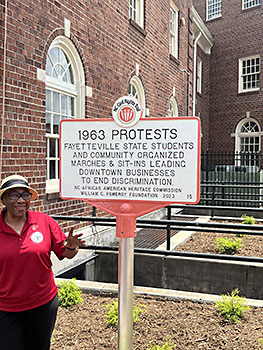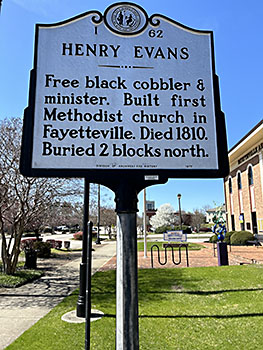 Listening to JoAnn Adams of Fayetteville share stories about African American history in the community rekindled stories of historic landmarks and once-thriving black neighborhoods in Fayetteville. The writer felt like a kid during story time, sitting in a crossed-legged style while listening intently to the storytelling of Fayetteville's rooted African American history. The only thing lacking was a blanket and a warm cup of tea.
Listening to JoAnn Adams of Fayetteville share stories about African American history in the community rekindled stories of historic landmarks and once-thriving black neighborhoods in Fayetteville. The writer felt like a kid during story time, sitting in a crossed-legged style while listening intently to the storytelling of Fayetteville's rooted African American history. The only thing lacking was a blanket and a warm cup of tea.
Those stories deserve to be highlighted, as each city has its own story—from the community's unsung heroes to prominent historical sites.
"Marker tells the stories of people, places, and things at a time that were relevant to that time. It lays dormant until somebody comes along and decides to bring it back to the forefront," Adams stated.
Adams also highlighted, "If you don't know your history, you will not connect to your past."
Fayetteville has an African American Heritage Trail for visitors to explore the African American history of Fayetteville, Cumberland County. According to the DistiNCtly Fayetteville website, the trail comprises 18 historical markers. The first marker begins at DistiNCtly Fayetteville at 245 Person Street and runs through Fayetteville State University.
The African American Heritage Tour leads tourists on a scavenger hunt through the city, exploring historic places and landmarks. The Trail stimulates education as tourists can learn about the city's early history, including the slavery era, free black enterprise, religion, education institutions, and much more.
Other historical stops include Fifer's Grave, Evans Metropolitan A.M.E. Zion Church named after Methodist Preacher Henry Evans, Saint Ann Catholic Church, Cross Creek Cemetery (Brookside), Saint Joseph's Episcopal Church, Orange Street School, E.E. Smith Monument, Martin Luther King, Jr. Park, Sandhills Family Heritage Center, Bethel AME Zion Church, Simon Temple A.M.E. Zion Church, Museum of the Cape Fear Historical Complex, Airborne and Special Operations Museum, Fayetteville History Museum, and the Market House.
The historical markers also detail the legacy of prominent community figures who had ties to Fayetteville, such as Charles W. Chesnutt (essayist, political activist, and lawyer), Hiram R. Revels (the first African American to serve in US Congress), Lewis Leary (African American harnessmaker), and Omar Ibn Said (Islamic Scholar and Slave Narratives Author).
A much richer African American history was revealed as the city of Fayetteville was inducted onto the North Carolina Civil Rights Trail, highlighting the city's 1963 protest to segregation thanks to community trailblazers like Adams.
Known for her research on the city's African American history, Adams pushed for the city to apply for the NC Civil Rights Trail through an initiative led by the NC African American Heritage Commission with funding from the William G. Pomeroy Foundation.
According to Adams, Mayor Mitch Colvin expressed interest in the initiative after she presented the historic marker program during a city council meeting, three-four years ago. The initiative was later executed by the city's Special Project Manager, Brook Redding, who worked closely with Adams and other community stakeholders.
Adams was happy with the city's emphasis on not forgetting the past and promoting community revitalization and preservation of the community's African American heritage. Last year, Adams was present for the unveiling of the NC Civil Rights Trail Marker. She stood side by side with former city councilwoman Shakeyla Ingram, who recognized her advocacy for pushing for a civil rights marker.
She believes citizens should always remember the rich history that exists right here in Fayetteville, especially for future generations.
"It's important for people, especially young people, to know that their history just didn't start the moment they were born. They had ancestors, and their history is important because it helps build self-esteem to know where you came from, how strong your ancestors were, and how they made their lives much better," she stated.
According to the Fayetteville Business Journal, revitalizing the African American Heritage Trail will include new signage and discoveries connecting with the Big Cross Creek Trail, Little Cross Creek Trail, Linear Park Trail, and others.
The African American Heritage Trail is a great educational adventure that not only memorializes history but also maintains our sense of community by remembering the contributions of African American leaders in Fayetteville-Cumberland County.
The trail is free and accessible to the public. For additional information on the trail, visitors can go to www.distinctlyfayettevillenc.com or visit the tourism information center in person during their hours of operation, Monday through Friday, 8 a.m. to 5 p.m.

 How to resolve AdBlock issue?
How to resolve AdBlock issue? 









